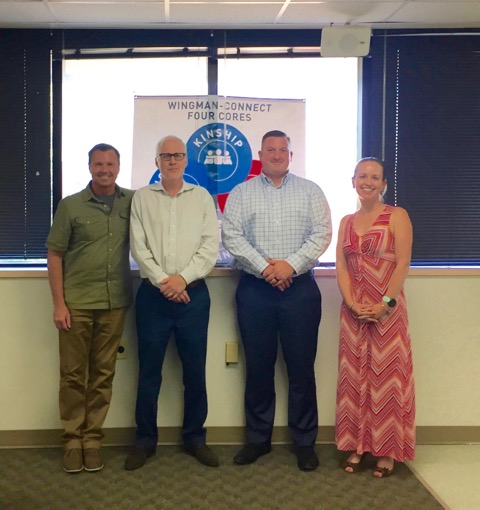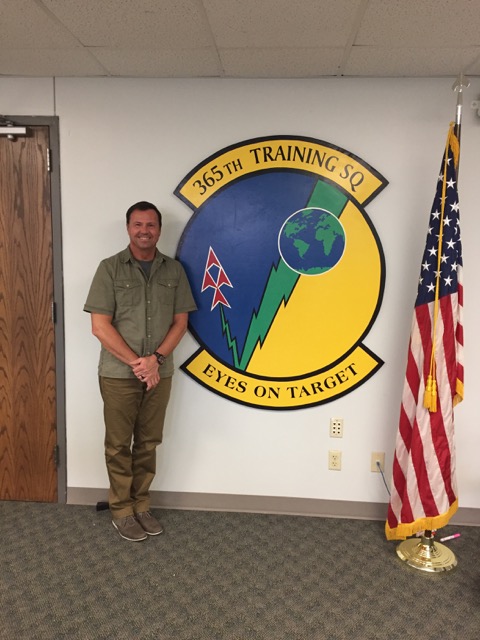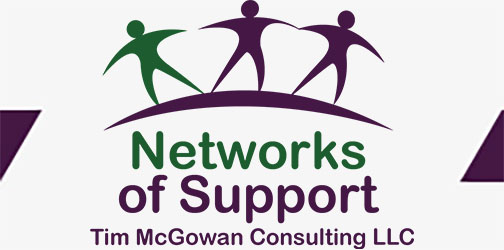November, 2018
 As I am ending another great week at Sheppard Air Force Base working with the 365 Squadron, I feel a sense of pride and satisfaction knowing what we are doing here is making a difference in the lives of these enlisted personnel. Upon further reflection, I realized I have not always provided the best answers or even a description of the work we are doing. To give a brief explanation of the data we are collecting for the research project or to share some of the many powerful stories of resilience we hear, would still be a very long narrative. However, the length of this writing should not deter from sharing some of what we are learning when it can positively impact our lives and the lives of those we love.
As I am ending another great week at Sheppard Air Force Base working with the 365 Squadron, I feel a sense of pride and satisfaction knowing what we are doing here is making a difference in the lives of these enlisted personnel. Upon further reflection, I realized I have not always provided the best answers or even a description of the work we are doing. To give a brief explanation of the data we are collecting for the research project or to share some of the many powerful stories of resilience we hear, would still be a very long narrative. However, the length of this writing should not deter from sharing some of what we are learning when it can positively impact our lives and the lives of those we love.
Please understand there are many moving parts to what we are doing and we are in the process of developing the most effective delivery methods that will have the most impact. This is an overview of what we are developing and the foundational philosophy behind this project.
Simply, the end game is to reduce military suicides by building healthy and supportive networks into the lives of the enlisted personnel early in their career so when they face challenging times they can access established support and know how to access support for others. The foundation of our work is the belief we should not have our first exposure to supportive networks when we need an intervention or treatment, as is the case many of times. This belief guides the work I do with schools, staff and agencies and all Networks of Support workshops I provide start with this belief as the foundation.
A story to help clarify our mission. There was a woman who lived in a community by a waterfall. Every day she would walk by the river’s edge near the waterfall. One particular day she heard a shout from the river and saw a person caught up in the current, about to go over the waterfall. Springing into action, she swam out to the person and pulled them to safety. The next day she was on her regular walk and heard another shout from a person in the current. As she was pulling this person to safety, she heard another shout and saw another person in the current. The people in the community began to realize that there were an overwhelming number of people caught in the current and swept toward the waterfall. They began to get organized: they trained lifeguards, put up signs, built watch towers, trained everyone in CPR and mouth-to-mouth resuscitation and held public meetings. They saved a lot of people but they were not able to save all of them, some still went over the waterfall. One day the woman started to walk upstream. The others began to say, “Where are you going? We need you here!” She replied, “I’m going upstream to see if I can keep some of the people from falling into the river in the first place.”
This story illustrates what is called “upstream prevention”. The truth is that most prevention trainings, suicide specifically, is really intervention. It focuses primarily on intervening in a crisis, training lifeguards and building watchtowers (gatekeeper training). It is often heavily focused on looking for risk factors and warning signs and making sure people in crisis receive the proper mental health care they need. It must be stressed and prioritized that when a person is struggling or in crisis, every resource needs to be made available for that person without question. As important as intervention is, it is hardly enough to turn the tide of people who face waterfall experiences in their lives and are unable to receive help or save themselves from the fall.
The Wingman-Connect training is a research project led by Dr. Peter Wyman of the University of Rochester and funded by the Department of Defense grant “Peer-led Suicide Prevention: Promoting Healthy Family Role Transitions for Military Personnel”. Wingman-Connect is a strength-based prevention approach that addresses stressors of work-force issues and life transitions by promoting skills that identify and strengthen four protective factors: kinship, guidance, purpose, and balance. Additionally, Wingman-Connect increases group cohesion, connectedness and shared purpose while decreasing resistance to seeking support while providing a place to practice the applicable skills needed to support self and others. The training is eight hours in length (no PowerPoints!) and is done over four days within a month’s timeframe. We are looking at the best practices of: discussion topics, sequencing of those discussions, Social-Emotional learning themes and how to make sure the training is pertinent and relevant to the participants. When we complete the research phase of the project in January, we will have delivered the training to over 1,500 personnel.
I am sure you will agree with me that over the last ten years, we have exponentially increased the amount of information we have and what we can find. Yet, with all this information, we are still seeing increases in suicide, drug addiction, violence issues, etc. If providing information and making people aware of issues is enough, then why are we seeing these increases? We cannot believe information and awareness is enough. These are a great place to start but people need others within their social network who will support them all the time. This includes mental health providers, mentors, guidance people, friends and family. Training must be provided to ensure everyone has the skills to support others and seek support for themselves or others. As we know, our social network is the first people to recognize when we are struggling.
We need to build and sustain relationships with supportive people and have the skills and training to walk ourselves and others to safety when needed. This should not just happen when someone is in crisis.
Upstream prevention seeks to build protective factors into a community, by teaching and modeling resiliency and coping skills, and strengthening connectedness within the social network so that no one falls into the river, or when they do, they are able to swim to shore and get themselves out of the river while the waters are still relatively calm. Upstream prevention refers to the approaches that reduce risk factors and enhance the protective processes that influence our decision-making. This approach focuses on strengthening and building protective factors into larger populations (schools & communities) and strengthening the capacity of the individual’s social network to help meet the social and emotional needs of people, thereby setting the stage for fewer interventions later in life.
The American Heart Association has proven this approach works. Instead of buying more ambulances, hiring more doctors and building more emergency rooms to address the increasing number of heart attacks, they looked at upstream prevention. Yearly physicals, and helping patients in lowering their blood pressure, cholesterol, and stress levels while encouraging a good diet and exercise program and increasing people’s knowledge about healthy and unhealthy fats are examples of the successful approaches in reducing heart attacks and heart disease.
Lastly, research shows that the most powerful influence in our lives is our peer groups. When our peer groups support us in change and our transitions, we have a significantly higher rate of success versus when we do not have that supportive network.
Our successes with Wingman-Connect will not only impact the military, but everyone in all aspects of their lives. This is why it is so important we get it right! Disconnect is not just happening in the military. Disconnect and lack of positive and supportive relationships is occurring in our communities, families, schools and the workplace. All programs within a community can work together. We can gain so much more by reaching out our hands rather pointing fingers.
February, 2019
Farewell to Sheppard Air Force Base
 At the end of January, we finished our training portion of the Wingman-Connect project. The researchers will now analyze the data and start to release their findings this spring. I posted about the project on November 5 on the Networks of Support FB page if you would like more information. Working with the enlisted personnel was a great experience and the early results from the research is showing the trainings had a positive impact.
At the end of January, we finished our training portion of the Wingman-Connect project. The researchers will now analyze the data and start to release their findings this spring. I posted about the project on November 5 on the Networks of Support FB page if you would like more information. Working with the enlisted personnel was a great experience and the early results from the research is showing the trainings had a positive impact.
The research is showing that the Wingman-Connect trainings do have a statistically significant impact on group cohesion. This is important as a protective factor in that the group recognizes when an individual is struggling and not only recognizes the struggles, but also knows how to access support for that individual. We never want anyone to sit in isolation when they are struggling with issues in their life. Having a supportive social network that moves to action is critical in developing prevention approaches vs. just being aware. This is a hugely important aspect as personnel move from assignment to assignment.
Even though we just completed the training portion a couple weeks ago, Dr. Heather Wilson (Secretary of the Air Force) and General David L. Goldfein (USAF Chief of Staff) put a correspondence out to all Air Force personnel recognizing the work of our project. They stated the Wingman-Connect approach is an innovative program that is aimed at increasing resilience and the understanding that seeking help is considered a strength. They encouraged everyone to open up and share their own stories of struggle and triumph and to use this experience to help others. I appreciate the support for and recognition of our work!
It is exciting to see the Air Force’s willingness to examine their methods and explore a new approach that focuses on the social network and support of an individual rather than just providing information, power points and expectations that everyone can navigate their life alone. It is going to take a major culture shift for positive change to happen.
As Secretary Wilson and General Goldfein wrote, “Despite our collective efforts and responsibility for their well-being, suicide remains the leading cause of death for Airmen. One suicide is too many. We must collectively work toward preventing those who are in despair from dying by suicide. Suicide prevention is really about a culture shift. Culture is our collective beliefs, actions and values; the things each of us say and do contributes to our Air Force culture. We need an Air Force culture where it is more common to seek help than to try to go at it alone.” Perfectly stated!
Dialogue is happening between our team and other branches of service to continue this approach. It would be honor to continue this work and to continue to support our service members.
Lastly, I would like to share a few examples of the typical feedback we received at the end of our trainings. These are not altered and absolutely reflect the consensus of the personnel we trained. It is clear to see why we built such a close attachment to these individuals.
- “On Tuesday I came here because I had to and today I came here because I wanted to. I feel like you can’t have too many positive experiences in your life and I feel like this was a positive experience.”
- “I think the thing I took away from this week is just how like lucky I have been to have the mentors that I’ve had to get the Kinship and the Purpose and the Balance. Just like the Guidance stuff has been really useful and this week- three days- just kind of made me realize that.”
- “I think I took a lot away- how people have different viewpoints on how they look at certain things and just really hear what they have to say and to just meet new people. It’s always a great experience.”
- “I like how the team building exercises really opened up a different line of dialogue in our class. Definitely helped establish more open relationships with each other.”
- “With how fast-paced tech school is it’s good to just take a moment to just winddown every once-in-a-while. A common quote I always tell myself is “Just remember why you came here”- I have a lot of reasons and I’m sure everyone else here does too- everyone has a lot of reasons why they came here- but that’s just something I always tell myself- or remind myself- just that.”
- “I enjoyed getting to meet everybody and getting to hear everyone’s perspectives. I really like the Cores because it makes you think about your life in a way that you probably don’t often think of it. It was just an eye-opening experience.”
